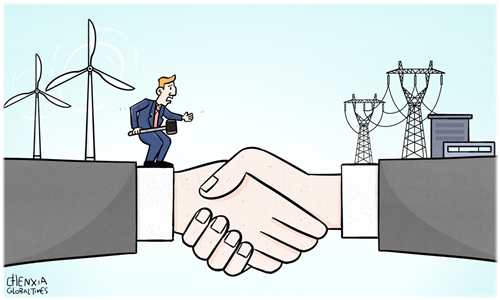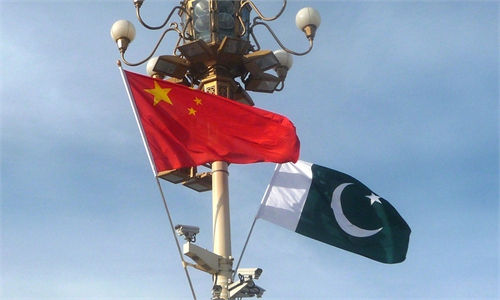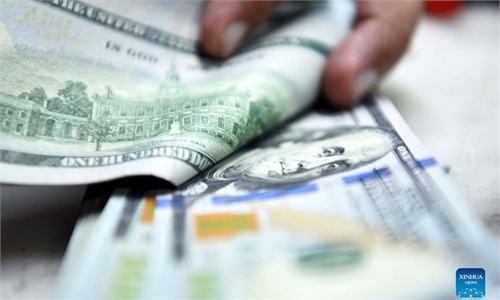
Illustration: Tang Tengfei/Global Times
In order to secure an early disbursement of an IMF loan, Pakistan's military chief has sought help from the US, some US media outlets have reported. The IMF last month finally agreed to provide a financial lifeline of $4 billion to Pakistan. However, the loan agreement is still subject to approval by the multilateral lender's board.Given that Pakistan is in dire need of funds and that Washington is the largest shareholder in the IMF, it is understandable that the Pakistani side is, as reports claimed, communicating with Washington. However, though Washington has not officially responded to the news, some US media outlets noted "troubled" relations between Pakistan and the US in recent years, suggesting that might weigh on the US' decision.
This is alarming because the US has no rights to dictate IMF loan terms to settle scores and serve its self-interests. Washington's playing favorites with IMF loans badly needed by some developing nations will only exacerbate a looming global debt crisis.
Pakistan's imports fell by more than a third in July after a ban on non-essentials, according to Reuters. While the imports decline has eased the pressure on the country's struggling currency, its foreign exchange reserves continues shrinking. As of July 22, the total foreign exchange reserves of the State Bank of Pakistan (SBP) fell to $8.58 billion - only enough for less than two months of imports. In the face of dwindling foreign exchange reserves, Pakistan is in an urgent need of the IMF loan.
If the reports about Pakistan asking help from Washington are true, it raises concerns that the US might take the opportunity to exert political pressure on Pakistan. For a long time, the US and its allies have been intensifying political pressuring on developing countries like Pakistan, causing a new economic dilemma for them.
Even more worrisome is that the IMF intends to ban Pakistan from seeking more Chinese loans, Indian media outlet NDTV reported in July. As Pakistan has restricted its own imports to tackle economic risks, the IMF should avoid the US' political interferences and step up the process of loan disbursement.
In face of a global debt crisis caused by factors like the COVID-19 pandemic and geopolitical conflicts, there are still many developing countries like Pakistan that are facing economic difficulties and need financial assistances. In addition, the sharp monetary policy shift of the US and other developed economies have further aggravated the global debt crisis and triggered competitive currency devaluation, with developing countries bearing the brunt.
Many believe global debt is currently at dangerously high levels and countries like Sri Lanka have been struggling. The Financial Time reported that Sri Lanka's president has warned IMF loan agreement may be pushed back until September. Some people have started to speculate on which country will become the next Sri Lanka. Yet, no country - not even the US - will immune itself from the impacts of a global debt crisis if more countries default like Sri Lanka.
The US and Western countries have stepped up political intervention, spared no effort to smear and slander China's aid and investment with groundless accusation. As they know well that Chinese investment and projects will only help local economies and advance regional integration, they should stop their smearing campaign and attempt to push countries to pick side.
It must be pointed out that on the issue of helping emerging market countries to ease their debt crises, China has been actively participating in global coordination efforts, and actively providing assistance and debt relief to help them get out of the predicament as soon as possible.
For instance, Zambia's official creditors led by China have agreed to provide debt relief to the southern African nation, paving the way for an IMF bailout and setting a precedent for how China could work with other lenders to tackle the threat of a wave of defaults across emerging markets, according to the Financial Times.
Furthermore, in addition to helping these countries get out of the immediate dilemma, China is also essentially promoting mutual beneficial cooperation with countries under the framework of the Belt and Road Initiative, which aims to build up these countries economic strength at the same time.
An increasing number of economists have called on the US and other Western countries to jointly coordinate global efforts with China to help developing countries like Pakistan tackle economic risks. At a difficult juncture for developing countries and the global economy, the US and other Western countries should put aside their zero-sum thinking, provide assistance, and advance coordinated global efforts to help relevant countries resolve their debt problems.
The author is a reporter with the Global Times. bizopinion@globaltimes.com.cn



